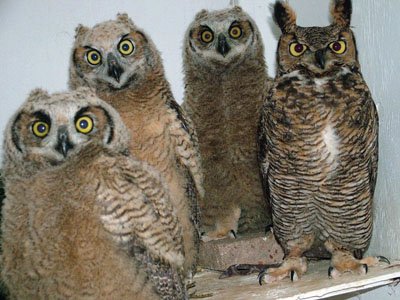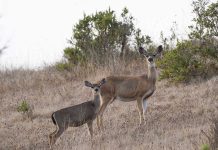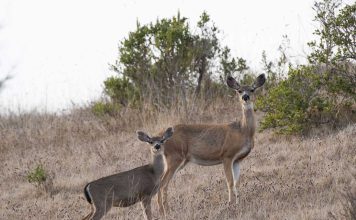Luna, the Wildlife Education and Rehabilitation Center’s
educational great horned owl, may be only 2 years old
– barely out of babyhood herself – but she is already an
experienced hoot’n-nanny.
Luna, the Wildlife Education and Rehabilitation Center’s educational great horned owl, may be only 2 years old – barely out of babyhood herself – but she is already an experienced hoot’n-nanny.
Last spring, she served as a surrogate mother to her first owlet, which helped it avoid becoming imprinted on the human caretakers. That young raptor was released on a clear October evening, back to its native habitat, a wild and beautiful bird.
Now Luna is a busy babysitter again, this time being kept company by three downy orphans that were rescued in May.
Two of them are siblings that had fallen from their nest in Gilroy, and were rescued near a busy intersection. Because one of the babies suffered an eye injury from the fall and needed medical treatment, it was a week before the two could go to Luna for foster parenting.
The day after they were “adopted” by Luna, a third owlet arrived. It had been illegally held captive as a pet by its finder. At WERC, the owl’s examination showed that it was malnourished from being fed an improper diet.
There was also critical concern that it might have been captured as a hatchling or young nestling and had already imprinted on humans. It was of utmost importance to determine if that was the case. If it was, the bird would not be releasable since an imprinted raptor does not recognize its species as its own, and instead identifies with humans. This does NOT mean that the bird is tame and friendly. An imprinted raptor is dangerous, as it will associate people with food and may “attack” with its strong and needle sharp talons and beak.
In addition, the raptor will not be recognized by others of its own species in the wild and will be driven out of its territory.
Once that owlet was placed with Luna, its behavior was watched closely to see how it reacted to Luna and the siblings in the enclosure and toward the volunteers who entered to feed and clean up.
Fortunately, the owl didn’t show evidence of being imprinted as it huddled with the other owls on their perch, and didn’t make the “chirping” sounds that can indicate it recognizes humans as its feeders. Instead, as with the other two owlets, it glared and clacked angrily at the volunteers.
Once again, Luna has done an outstanding job of raising wild owls and she has earned a well-deserved rest, peace and quiet in her enclosure. The three youngsters were recently transferred to a large flight aviary, where they will remain until their release this fall.
n n n
Mark your calendars! The Wildlife Fest, WERC’s annual barbecue-auction fundraiser will be held from 12 to 3 p.m. Oct. 23 at the Morgan Hill Buddhist Community Center. There will be great food, auction items, raffles, gifts and fun activities for the kids. Have a fantastic time while helping our wildlife stay healthy and wild.














